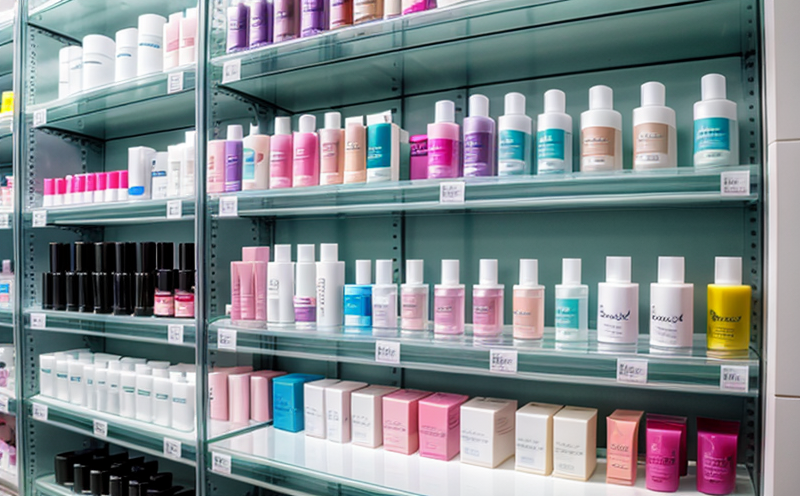Vitamin E Stability Testing in Cosmetic Lotions
The stability and shelf life of cosmetic formulations are critical factors that influence consumer satisfaction and product longevity. Vitamin E, also known as tocopherol, is a widely used antioxidant in cosmetics due to its ability to prevent oxidative stress within the formulation, thereby extending the product's shelf life. This service focuses on testing the stability of vitamin E in cosmetic lotions under various conditions to ensure compliance with international standards such as ISO 25098 and FDA regulations.
During this testing process, we subject cosmetic lotions containing vitamin E to accelerated aging conditions that mimic real-world storage scenarios over extended periods. These conditions can include exposure to heat, light, humidity, and oxidative stressors. The aim is to assess the integrity of vitamin E within these formulations, ensuring it remains effective throughout its intended shelf life.
The testing protocol involves several key steps: specimen preparation, aging under controlled conditions, extraction of vitamin E from the lotion sample, quantification using high-performance liquid chromatography (HPLC), and comparison against baseline values. This approach allows us to determine if there has been any degradation or loss in potency over time. Compliance with international standards ensures that our clients can confidently market their products globally.
Understanding vitamin E stability is crucial for several reasons. Firstly, it affects the overall quality of the product by maintaining its efficacy and preventing potential health risks associated with oxidized compounds. Secondly, stable formulations are more likely to meet regulatory requirements, reducing the risk of recalls or legal issues. Lastly, products that consistently demonstrate long-term stability can build consumer trust and loyalty.
Our team employs advanced analytical techniques such as HPLC coupled with UV detection for precise quantification. This method provides accurate measurements even when dealing with minute quantities of vitamin E present in cosmetic lotions. By leveraging these sophisticated tools, we ensure that our clients receive reliable data on the stability of vitamin E.
In conclusion, conducting thorough stability testing is essential for any manufacturer aiming to produce high-quality cosmetic products. Our service offers a comprehensive assessment of vitamin E stability within cosmetic lotions, providing peace of mind knowing that your product meets stringent quality standards and regulatory expectations.
Why It Matters
The importance of ensuring the stability and shelf life of cosmetic formulations cannot be overstated. Consumers expect products to perform consistently over time without losing their intended benefits. For vitamin E specifically, maintaining its integrity is vital because it plays a key role in preserving the quality and safety of cosmetics.
From an operational perspective, reliable stability testing helps companies identify potential issues early on, allowing them to address these concerns before they become significant problems. This proactive approach not only enhances product reliability but also minimizes costly rework or recall efforts later down the line.
Regulatory compliance is another crucial factor when it comes to vitamin E stability in cosmetic lotions. Many countries have specific requirements regarding ingredient labeling and quality control measures for personal care products. By adhering to these guidelines through robust testing procedures, manufacturers can avoid penalties and maintain their reputation as responsible corporate citizens.
Moreover, understanding the impact of environmental factors like temperature fluctuations on vitamin E stability enables formulators to optimize packaging designs to protect against adverse conditions. Such insights contribute significantly towards developing more sustainable practices within the industry by reducing waste associated with expired or compromised products.
In summary, investing in comprehensive stability testing ensures that cosmetic manufacturers deliver consistent, safe, and effective products while meeting regulatory demands and fostering a culture of sustainability.
Environmental and Sustainability Contributions
The pursuit of sustainable practices within the cosmetics industry extends beyond mere compliance; it encompasses efforts aimed at reducing environmental impacts throughout product lifecycle stages. One significant aspect involves minimizing waste generated by expired or compromised products due to poor stability performance. By investing in thorough testing protocols, manufacturers can significantly reduce such waste.
Additionally, optimizing packaging materials based on stability test results leads to more efficient use of resources and reduced carbon footprints associated with manufacturing processes. For instance, if certain conditions lead to faster degradation rates, companies may reconsider packaging options that offer better protection against those specific challenges.
Furthermore, transparent communication about ingredient efficacy and safety fosters trust among consumers who increasingly demand eco-friendly alternatives. Demonstrating commitment to sustainability through rigorous testing reinforces this image positively.
Incorporating sustainable practices into routine operations also promotes innovation within the sector by encouraging research into alternative ingredients or formulations that enhance stability without compromising on effectiveness or consumer satisfaction.
Competitive Advantage and Market Impact
Stability testing plays a pivotal role in enhancing competitive positioning within the cosmetics market. Consumers today are more discerning than ever before, seeking out brands that consistently deliver high-quality products with proven longevity. Brands that invest in comprehensive stability testing can position themselves as leaders in quality assurance.
Achieving reliable shelf life data through rigorous testing not only builds consumer confidence but also differentiates a brand from competitors who may lack comparable credentials. This competitive edge translates into increased market share and customer loyalty, ultimately driving business growth.
From an operational standpoint, successful stability tests contribute to efficient supply chain management by identifying optimal storage conditions early on. Such knowledge enables companies to streamline inventory control processes, reducing costs associated with holding excess stock or managing frequent restocks due to product expiration.
In terms of regulatory compliance, demonstrating robust testing capabilities strengthens a brand's reputation among regulators and industry peers alike. This recognition can open doors to new markets where stringent standards apply, providing opportunities for expansion into untapped territories.
Moreover, sustainability initiatives supported by reliable stability data appeal directly to eco-conscious consumers who prioritize environmentally friendly practices across all aspects of their lives. By leading the charge in this area, brands not only align with consumer expectations but also set benchmarks for others within the industry.





